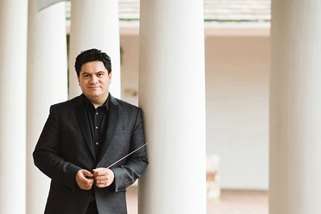|
Back
American Masters Philadelphia
Verizon Hall
11/23/2018 - & November 24*, 2018
Jake Heggie: Moby-Dick, Orchestral Suite (arr. Cristian Măcelaru)
Samuel Barber: Piano Concerto, Op. 36
Aaron Copland: Appalachian Spring (complete)
Garrick Ohlsson (piano)
The Philadelphia Orchestra, Cristian Măcelaru (conductor)

C. Măcelaru (© Adriane White)
Conductor Cristian Măcelaru impressed on many musical levels during his three-year residency with the Philadelphia Orchestra. The maestro was back with The Philadelphians this month to conduct an American composer program on Thanksgiving weekend. It was a reminder of how dynamic Măcelaru is in bringing both depth and dimension to large orchestral works. And in the case of the full orchestra restoration of Aaron Coplandís Appalachian Spring, giving definitive readings.
The concert opener was Măcelaruís own arrangement of a Suite to Jake Heggieís opera Moby-Dick. A rather gripping opener on the bill with Samuel Barberís complex and theatrical Piano Concerto and Aaron Coplandís Appalachian Spring. Măcelaru was assistant conductor for the opera when it premiered at the Dallas Opera in 2010 and loved it so much he wanted to create an orchestral suite for the concert hall. It condenses the scope of the full operaĖtempests, oceanic atmospheres, and tempests above and below deck about those mythical seamen. The instruments voicing characters of Ahab, Pip, Queequeg and Melvilleís whale making a ghostly appearance most dramatically. Măcelaru told the audience that Melvilleís epic also symbolized a universal search for truth. Inevitably, like many other orchestral adaptations of larger symphonic works, the Suite does have a disjointed quality but certainly is intriguing enough to want you to hear the entire opera.
Samuel Barber composed his Piano Concerto in the aftermath of his sisterís death. Whether his grief or tragic circumstances of losing a beloved sibling is directly articulated is not known. But Barber struggled to complete the concerto. The work though evokes intimate, interior drama, full of loud, intense musical expression and complex musicality. Barber composed it at Capricorn, his and Gian Carlo Menottiís artist retreat for musicians. Pianist John Browning was the first to perform it and Barber had his strengths as a musician in mind. Vladimir Horowitz was on hand at Capricorn, and both virtuoso players told Barber that some of the technical requirements (arpeggios, dense chords) for the third movement, for instance, arpeggio would be insurmountable. Not only did Browning master those complexities, but it has also remained a modern piano concerto masterpiece. Garrick Ohlsson also brings his own artistry to the piece and on this night delivered an altogether, soulful and technically electrifying performance. Ohlsson is a Chopin specialist and his suppleness and quietness in the Barber are just as vital to the work as the clamoring fortissimo and densest of chord clusters. His tempos left open by Barber (even though publishers of the music had inserted them for musicianís use), Ohlssonís interpretive artistry and tempos are truly defining. Mercury dexterity. Principal oboist Peter Smith, on both the Heggie and Barber, proved a masterful lyric oboist.
Eugene Ormandy suggested to Copland that he develop a full orchestra version of Appalachian Spring and conducted the first version in 1954, but the work was never completed. A few years ago, it was fully fleshed out by composer David Newman in collaboration with the Graham Company and musicologists. In his excellent program notes, Christopher Gibbs points out Grahamís storyline reduction leans on the pastoral, directly quoted Shaker folk music (Simple Gifts) to depict the country courtship and wedding of a pioneer woman. Copland though did not have that story in mind for his full composition. With the restored passages back in and the full orchestra, it displays Coplandís more complex, modernist symphonic ideas. Măcelaru ignites the full work, that proves to have many more musical gifts and indeed on equal footing with Grahamís ballet, and more famous version.
Lewis Whittington
|